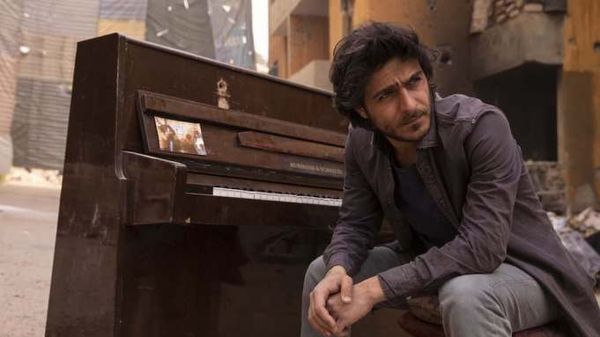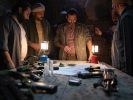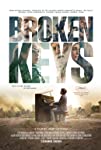Eye For Film >> Movies >> Broken Keys (2020) Film Review
Broken Keys
Reviewed by: Amber Wilkinson

There's a polished quality to the look and feel of Jimmy Keyrouz's debut feature - an expansion of his award-winning short Nocturne In Black and Lebanon's submission for this year's International Film Oscar - and it is also lent a docureal element by the fact it was partially shot in the genuine conflict zone of Mosul, which had only recently been liberated from ISIS. Broken Keys is a tale of quiet resistance and hope for a better future in the face of conflict, which though a little broad brush in its strokes and tending towards sentimentality in places, nevertheless packages its difficult themes well for a mainstream audience.
The story centres on Karim (Tarek Yaacoub, reprising his role from the short), an accomplished pianist who is living under the repressive regime of Islamist extremists in a Syrian city, where music, among many other things, is banned. In defiance of this, he bolsters the spirit of others who share the communal area many have retreated to in the face of the destruction of their homes, by playing his piano when (hopefully) no enemy ears are close enough to hear while trying to scrape together the money for a people smuggler to help him escape. The piano - once his mother's, not the only element of the plot that tends towards cliche - is, not surprisingly, living on borrowed time, given that the walls have ears as well as bullet holes.

Keyrouz and cinematographer Joe Saade establish a good contrast between the warmth of the shared living space, often lit by lamplight, and the cold and harsh exterior of the city, which helps to feed the sense of tension and threat represented by the black-clad ISIS members, including Abdallah (Julian Farhat), a former classmate of Karim's and the one who takes a gun to his beloved piano. Overt violence is used sparingly but effectively, with a public whipping in a square and an execution used to show the climate of fear that is maintained by the extremists. The writer/director also captures the incongruous way that some sort of normality continues even in a warzone. Children, including Ziad (Ibrahim El Kurdi) - whose mother is dead and whose father we see being carted off by ISIS near the start of the film - find a way to play and scavenge among the rubble, while shop owner Abou Moussa(Mounir Maasri), who Karim does odd jobs for, emphasises the positive by preparing his shop for a grand reopening.
The piano symbolises not just a touchstone of Karim's past and an act of defiance but also a hope for the future when he hatches a plan to repair it for sale to make the cash he needs to flee. His plan opens the film out into a mid-section in a different city, where he encounters resistance fighter Samar (Rola Beksmati, looking remarkably glamorous considering she's supposed to have been living in a warzone). Like many first-time feature directors before him, Keyrouz begins to push things with a little too much incident and coincidence, so that some of the plot manoeuvres here, including the whiff of potential romance, are uneven compared to what has gone before and leave less time for him to focus on the meat of his characters and story back in Karim's home town. Less would be more, in general, especially from veteran composer Gabriel Yared, whose score tends towards the syrupy and overbearing.
But if the script and story has dalliances that affect the pace in the film's midsection, Keyrouz takes firm control again the film's back quarter, as Karim faces increasing internal conflict about what his next move should be, with the mood intensifying as little Ziad also makes plans of his own. This may not be pitch perfect but as a celebration of courage and community under fire, it strikes a strong note.
Reviewed on: 02 May 2021
















